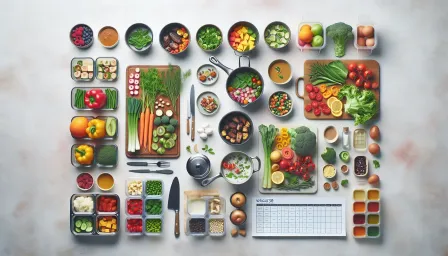Discover How Cooking at Home and Stress Relief Go Hand-in-Hand

Explore the connection between cooking at home and stress relief. Learn how home cooking can be a therapeutic activity that reduces stress and improves mental well-being.
In the fast-paced world we live in, finding activities that help alleviate stress is invaluable. One such underrated activity is cooking at home. This article aims to unravel the profound connection between cooking at home and stress relief, offering insights into how you can make your kitchen a sanctuary for mental well-being.
The Therapeutic Benefits of Cooking at Home
Cooking at home offers numerous benefits, both tangible and intangible. While the tangible outcomes include healthier meals and cost savings, the intangible benefits primarily revolve around stress relief and mental health improvement.
Mindfulness and Focus
Cooking requires concentration and attention to detail, encouraging a state of mindfulness. Mindfulness is a mental state achieved by focusing on the present moment, which can significantly reduce stress levels. As you engage in chopping vegetables, measuring ingredients, and stirring pots, your mind stays present, helping to distract from worries and anxieties.
Sensory Experience
Cooking engages all five senses—sight, smell, taste, touch, and sound—providing a multisensory experience that can be incredibly soothing. The aroma of fresh herbs, the sizzle of ingredients in a pan, and the vibrant colors of vegetables can stimulate a sense of calm and joy, contributing to stress relief.
Cooking as a Form of Creative Expression
Creativity is a powerful tool for stress management. Cooking allows for creative expression through experimenting with new recipes, presentation, and even improvisation. This creative process can be highly fulfilling and provide a sense of accomplishment, which is essential for mental well-being.
Experimentation and Innovation
When cooking at home, you have the freedom to experiment with flavors, textures, and ingredients. This experimentation fosters innovation and creativity, allowing you to escape the rigidity of daily routines and engage in a liberating activity.
Personal Connection to Food
Preparing your meals gives you a personal connection to the food you eat. This connection can create a sense of appreciation and mindfulness about what nourishes your body, leading to healthier eating habits and reduced stress related to diet and health concerns.
Building Routine and Structure
Routine and structure are crucial for mental health as they provide a sense of stability and predictability. Cooking at home can be an integral part of your daily or weekly routine, offering a stable and enjoyable activity to look forward to.
Mealtime as a Ritual
Turning mealtime into a ritualistic activity can add a sense of ceremony and relaxation. Whether it's preparing a meal for yourself or for loved ones, this ritual can create cherished moments that foster a sense of togetherness and relaxation.
Planning and Organization
The process of planning meals, organizing ingredients, and preparing dishes can provide a sense of control and order, which are essential for reducing stress. Having a well-organized kitchen and meal plan can make the entire cooking process more streamlined and enjoyable.
Social Connection Through Cooking
Cooking at home can strengthen social bonds, whether you cook for family, friends, or invite neighbors over for a meal. Sharing a meal is one of the oldest forms of human connection and community building.
Family Bonding
Cooking and eating together as a family can enhance relationships and provide a medium for communication. It also sets a positive example for children, teaching them the importance of healthy eating and culinary skills.
Hosting and Sharing
Inviting friends over for a homemade meal can strengthen friendships and create memorable experiences. Cooking for others is an act of love and care, which can boost your mood and reduce feelings of loneliness or isolation.
Practical Tips for Stress-Free Cooking at Home
If you're new to cooking or find it stressful, here are some practical tips to make the experience more enjoyable and stress-free:
Start Simple
Begin with simple recipes that don’t require extensive preparation or cooking time. As you build confidence and skill, you can gradually move on to more complex dishes.
Create a Relaxing Environment
Set the mood by playing your favorite music, lighting candles, or ensuring your kitchen is clean and organized. A pleasant environment can enhance the overall cooking experience.
Prep in Advance
Prepare ingredients ahead of time to make the cooking process smoother. Chopping vegetables, marinating meats, or measuring spices in advance can save time and reduce stress during meal preparation.
Cook in Batches
Batch cooking can save time and effort, especially on busy days. Prepare large quantities of food that can be frozen or stored for future meals, ensuring you always have homemade food on hand.
Embrace Imperfection
Remember, cooking is as much about the journey as it is about the destination. Mistakes are part of the learning process, and embracing imperfection can make cooking a more enjoyable and stress-free activity.
Conclusion: The Harmony of Cooking and Stress Relief
Cooking at home is more than just a means to an end. It's an activity that nurtures both your body and mind. From the therapeutic benefits of mindfulness and sensory engagement to the joys of creative expression and social connectivity, cooking can be a powerful tool for stress relief and overall mental well-being. By integrating cooking into your routine and approaching it with a positive mindset, you can transform your kitchen into a sanctuary of calm and joy.



























